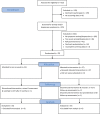Effect of Cognitive Behavioral Therapy on Clinical Disease Course in Adolescents and Young Adults With Inflammatory Bowel Disease and Subclinical Anxiety and/or Depression: Results of a Randomized Trial
- PMID: 31050763
- PMCID: PMC7006993
- DOI: 10.1093/ibd/izz073
Effect of Cognitive Behavioral Therapy on Clinical Disease Course in Adolescents and Young Adults With Inflammatory Bowel Disease and Subclinical Anxiety and/or Depression: Results of a Randomized Trial
Abstract
Background: Anxiety and depressive symptoms are prevalent in patients with inflammatory bowel disease (IBD) and may negatively influence disease course. Disease activity could be affected positively by treatment of psychological symptoms. We investigated the effect of cognitive behavioral therapy (CBT) on clinical disease course in 10-25-year-old IBD patients experiencing subclinical anxiety and/or depression.
Methods: In this multicenter parallel group randomized controlled trial, IBD patients were randomized to disease-specific CBT in addition to standard medical care (CBT + care us usual [CAU]) or CAU only. The primary outcome was time to first relapse in the first 12 months. Secondary outcomes were clinical disease activity, fecal calprotectin, and C-reactive protein (CRP). Survival analyses and linear mixed models were performed to compare groups.
Results: Seventy patients were randomized (CBT+CAU = 37, CAU = 33), with a mean age of 18.3 years (±50% < 18 y, 31.4% male, 51.4% Crohn's disease, 93% in remission). Time to first relapse did not differ between patients in the CBT+CAU group vs the CAU group (n = 65, P = 0.915). Furthermore, clinical disease activity, fecal calprotectin, and CRP did not significantly change over time between/within both groups. Exploratory analyses in 10-18-year-old patients showed a 9% increase per month of fecal calprotectin and a 7% increase per month of serum CRP in the CAU group, which was not seen in the CAU+CBT group.
Conclusions: CBT did not influence time to relapse in young IBD patients with subclinical anxiety and/or depression. However, exploratory analyses may suggest a beneficial effect of CBT on inflammatory markers in children.
Keywords: IBD; anxiety; children; cognitive behavioral therapy; depression; disease course; psychotherapy.
© 2019 Crohn’s & Colitis Foundation. Published by Oxford University Press. All rights reserved. For permissions, please e-mail: journals.permissions@oup.com.
Figures
References
-
- Daniel JM. Young adults’ perceptions of living with chronic inflammatory bowel disease. Gastroenterol Nurs. 2002;25:83–94. - PubMed
Publication types
MeSH terms
Substances
LinkOut - more resources
Full Text Sources
Medical
Research Materials
Miscellaneous




